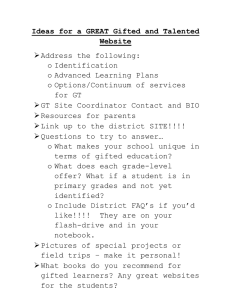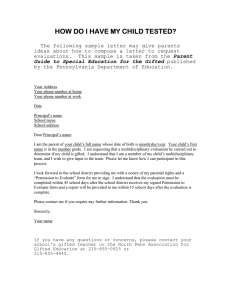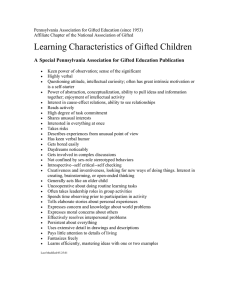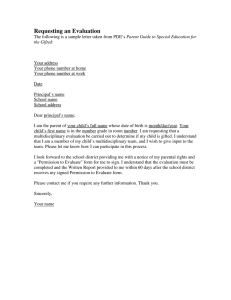{ How Do I Work with My Child’s School? Tracy Inman, Ed.D.
advertisement
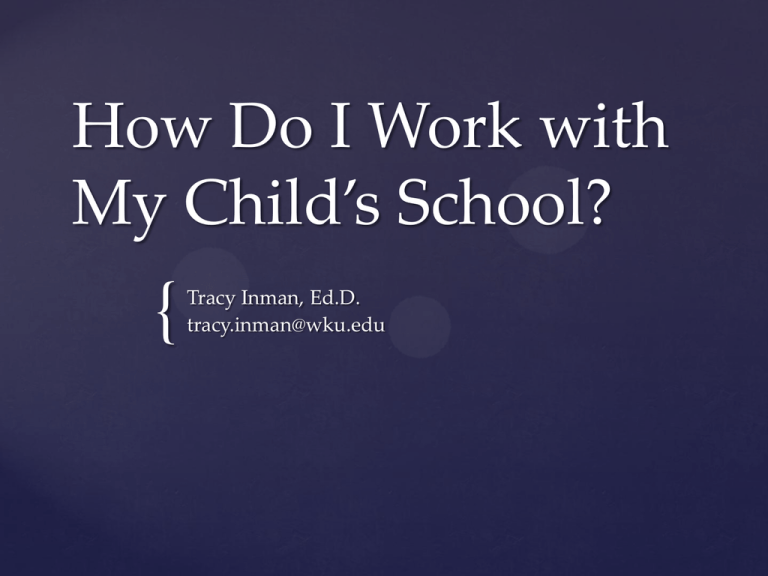
How Do I Work with
My Child’s School?
{
Tracy Inman, Ed.D.
tracy.inman@wku.edu
“Positive, patient,
and persevering
remain the critical
traits for parent
advocacy.”
Keys to Parenting the Gifted Child (Rimm, 1994)
1.
2.
3.
4.
5.
6.
Know the facts
Know your rights
Know the protocol
Know how to communicate
effectively
Know the questions to ask
Know how to partner
Be informed…
About your child
About gifted children in general
About gifted education
About gifted education in the district and the
school
About the terminology
Know the facts…
About your child
Strengths and weaknesses
Objective data: achievement test results, ability
test results, etc.
Anecdotes and examples of work done at home
or in extracurricular activities
Know the facts…
About your child
About gifted children in general
Characteristics
Asynchronous development
Needs: social, emotional, and cognitive
Know the facts…
About your child
About gifted children in general
About gifted education
Myths
Effective strategies
Reports
A Nation Deceived: How Schools Hold Back
America’s Brightest Students
Talent on the Sidelines: Excellence Gaps and
America’s Persistent Talent Underclass
Know the facts…
About your child
About gifted children in general
About gifted education
About gifted education in the state, district,
and school
State law, regulations, and statutes
District policy
School policy
SBDM policies
Identification procedures
Services offered
Know the facts…
About your child
About gifted children in general
About gifted education
About gifted education in the district and the
school
About the terminology
Nurturing Our Future pamphlet
Communicating Effectively with Your Gifted Child’s
School article
Know the facts…
1.
2.
3.
4.
5.
6.
Know the facts
Know your rights
Know the protocol
Know how to communicate
effectively
Know the questions to ask
Know how to partner
Be informed…
Gifted Children’s Bill of Rights
Gifted Regulation
Identification
Primary Talent Pool vs. Formal Identification
Gifted Student Service Plan
Services
Other regulations
Early Entrance to Kindergarten
Educational Enhancement
Know your rights…
1.
2.
3.
4.
5.
6.
Know the facts
Know your rights
Know the protocol
Know how to communicate
effectively
Know the questions to ask
Know how to partner
Be informed…
Teacher
Gifted and Talented Teacher
Principal
Gifted Coordinator at Central Office
Superintendent
Know the protocol…
1.
2.
3.
4.
5.
6.
Know the facts
Know your rights
Know the protocol
Know how to communicate
effectively
Know the questions to ask
Know how to partner
Be informed…
“The best way to see that your child reaches his full potential
is to form alliances with his teachers, because when it comes
to dealing with these challenging, rewarding children, parents
and teachers are the strongest resources for each other.”
Helping Gifted Children Soar (Whitney & Hirsch, 2011)
The wish list
Understanding the educator
Formal versus informal
The conference
Know how to communicate
effectively…
Parents, what do you wish
teachers knew?
Educators, what do you
wish parents knew?
The wish list
The wish list
Understanding the educator
Lack of formal training
Differentiation for struggling learners
Belief in the myths
Emphasis on accountability and high-stakes
testing
Know the how to
communicate effectively…
The wish list
Understand the educator
Formal versus informal
The conference
Know the how to
communicate effectively…
{ Formal
Written
correspondence
Conferences
{ Informal
Parents participate
in school events
Parents volunteer in
classroom
Usually more
valuable
Establishes trust
communication
The wish list
Understand the educator
Formal versus informal
The conference
Know the how to
communicate effectively…
1.
2.
3.
4.
5.
6.
7.
8.
9.
10.
11.
Control your emotions.
Thank one another for taking the time to meet.
Listen first.
Make eye contact.
Wait before you respond.
Paraphrase.
Be courteous.
Stress “we,” not “you.”
Keep an open mind.
Write a note of thanks to the teacher that summarizes the
key points of your discussion and the decisions or
agreements that were made.
Understand that you will probably need more conferences.
Suggestions for Effective
Conferences
(Whitney & Hirsch, 2011)
1.
2.
3.
4.
5.
Plan ahead.
Establish a feeling of teamwork.
Listen carefully for positive and negative
ways the teacher describes your child.
Clarify expectations – yours and the teacher’s.
Don’t assume that the teacher has a great deal
of experience with educating gifted children.
Tips for Your Gifted Kids’
Parent-Teacher Conferences
(Berger, 2014)
1.
2.
3.
4.
5.
6.
7.
8.
9.
10.
Make an appointment. Don’t just drop in.
Document what your child has done, said, or read.
Plan what you're going to say.
Choose your words carefully. Try to start with
something positive.
Build a partnership and negotiate solutions. Work
as a team.
Be diplomatic, tactful, and respectful.
Focus on what your child needs.
Listen.
Bring along your sense of humor.
Summarize what you have discussed and a time
line. Plan a follow-up meeting.
Tips for Talking to Teachers
(Walker, 2002)
1.
2.
3.
4.
5.
6.
Know the facts
Know your rights
Know the protocol
Know how to communicate
effectively
Know the questions to ask
Know how to partner
Be informed…
Know the questions to ask…
1.
2.
3.
4.
5.
6.
7.
What services are available for gifted students in
this school and school system, and what are the
goals of such services?
How much time each week will my child spend in
the gifted education program or receive services?
Have the teachers in the gifted education program
received specialized training?
Has my child received an assessment?
Are there specialized materials (e.g., software)
used in the gifted education program or services?
How will the school know if the gifted education
program or services are working?
How can I help the program?
Questions Parents of Gifted
Children Should Ask Schools
(Gallagher, 1998)
1.
2.
3.
4.
5.
What are your academic goals for the year?
What do you see as my child’s strengths? Can
you give me some examples?
What are some areas that my child needs to
work on?
How would you evaluate my child’s learning
profile?
How can I help?
Important Questions to
Ask the Teacher
(Berger, 2014)
1.
2.
3.
Read the KAGE brochure What Are You
Doing to Find and Develop My Child’s
Talents?
Star the five most important questions to
ask.
Are there any questions that would make
you uncomfortable to ask?
Other Important Questions
for Schools and Teachers
1.
2.
3.
4.
5.
6.
Know the facts
Know your rights
Know the protocol
Know how to communicate
effectively
Know the questions to ask
Know how to partner
Be informed…
Volunteer
Acknowledge varied perspectives
Listen
Share information and opportunities
KAGE
Be a member
Encourage teachers and school to be
members
Give individual or institutional
memberships
Know how to partner…
Being informed allows
you to be the best
advocate for your child
when working with
your child’s school.
Be informed…
1.
2.
3.
4.
An education that fits their
intellectual and level and talents
Learning with their true peers
A supportive, responsive learning
environment
Professionals who can respond to
their needs
Making School a Better Place
for Gifted Kids
(Walker, 2002)
Berger, S. (2014). Tips for your gifted kids’ parent-teacher conferences. familyeducation. Retrieved
from http://school.familyeducation.com/gifted-education/parent-teacher-conferences/38665.html
Colangelo, N., Assouline, S. G., & Gross, M. U. M. (2004). A nation deceived: How schools hold back
America’s brightest students (Vol. 1). Iowa City: The University of Iowa, The Connie Belin &
Jacqueline N. Blank International Center for Gifted Education and Talent Development. Retrieved
from http://www.accelerationinstitute.org/nation_deceived/
Plucker, P., Hardesty, J., & and Burroughs, N. (2014). Talent on the sidelines: Excellence gaps and
America’s persistent talent underclass. Storrs, CT: Center for education Policy Analysis. Retrieved
from http://cepa.uconn.edu/uconncepa/assets/File/AG/excellence2013/
Excellence%20Gap%2010%2018%2013_JP_LK.pdf
Rimm, S. (1994). Keys to parenting the gifted child. New York, NY: Barron’s Educational Services, Inc.
Shoplik, A. (2009-10). Tips for parents: Advocacy – working with your child’s school. Davidson Institute
for Talent Development. Retrieved from http://www.davidsongifted.org/db/Articles_id_10558.aspx
Walker, S. Y. (2002). The survival guide for parents of gifted kids: How to understand, live with, and stick
up for your gifted child. Minneapolis, MN: Free Spirit Publishing.
Whitney, C. S., & Hirsch, G. (2011). Helping gifted children soar: A practical guide for parents and
teachers (2nd ed.) Scottsdale, AZ: Great Potential Press.
resources

